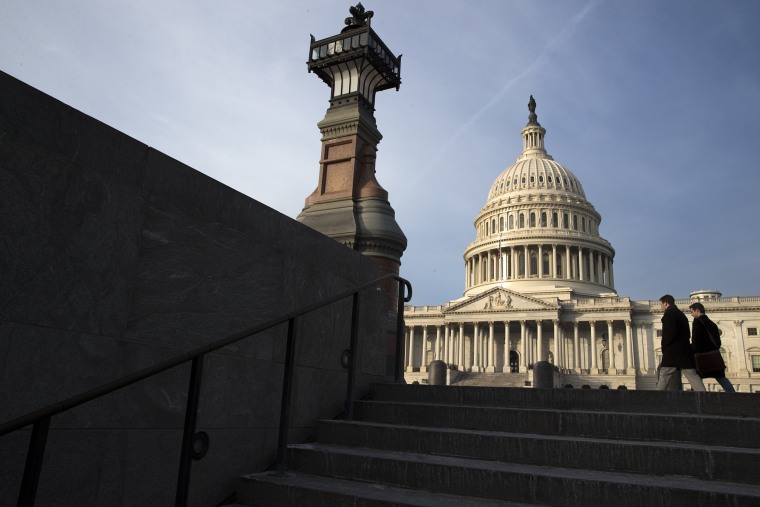By most measures, the Democrats' COVID relief package is likely to be the biggest and most consequential legislative breakthrough of the year. It's an ambitious, $1.9 trillion plan, featuring direct-aid checks, money for vaccine distribution, enhanced unemployment benefits, aid for state and local governments, a generous child tax credit, and an eviction ban. The impact on combatting the pandemic and bolstering the economy will be dramatic.
But in the early hours of Saturday morning, it passed without a single Republican vote.
The House voted early Saturday to pass President Joe Biden's $1.9 trillion Covid-19 relief package, a step to implementing his vision for bringing the pandemic under control just days after the U.S. crossed the tragic milestone of 500,000 deaths.... The vote split largely on partisan lines, with every Republican voting against the measure and just two Democrats joining them — Jared Golden of Maine and Kurt Schrader of Oregon.
The final roll call on the 219-212 vote is online here. As of two weeks ago, Republican leaders said they expected at least some -- not many, but some -- of their own members to end up supporting the Democrats' COVID relief package. Those predictions were apparently off a bit.
There is a degree of historical symmetry to the final tally: when Bill Clinton's economic plan came to the House floor in early 1993, it received zero GOP votes. When Barack Obama's Recovery Act reached the House floor in 2009, it also received zero Republican support. As of Saturday morning, the streak continues.
What's far more surprising, however, is the passivity with which GOP leaders are targeting this bill. It's as if Republicans looked at the polls, saw how popular the Democratic plan is, and decided the smart political ploy would be to simply downplay its significance.
In his first major appearance since leaving the White House, Donald Trump largely ignored the relief bill yesterday, and at the Conservative Political Action Conference (CPAC), the former president wasn't alone.
The New York Times noted, "As the conference began, House Democrats were preparing to approve a coronavirus relief package worth nearly $2 trillion that was opposed by every House Republican. But inside the Hyatt Regency in Orlando, it was hard to find many conservatives who cared."
The right's indifference notwithstanding, the Senate is moving forward with consideration of the bill this week, and Democratic leaders, at least for now, are broadly optimistic. The biggest sticking point was likely to be a provision on raising the federal minimum wage to $15 an hour, but in the wake of the Senate parliamentarian's ruling last week, the fight is on track to be put aside for another day.
Late last week, Senate Finance Chair Ron Wyden (D-Ore.) and Senate Budget Chair Bernie Sanders (I-Vt.) floated a Plan B -- imposing tax penalties on major employers who failed to pay their workers at least $15 per hour -- but the Washington Post reported yesterday that Democratic leaders are "walking away from that backup effort," after encountering "numerous practical and political challenges in drafting their proposal over the weekend."
The article added, "Economists and tax experts have said that the tax outlined by Sanders and Wyden could be easily avoided and difficult to implement, with large corporations able to reclassify workers as contractors to avoid potential penalties."
I've seen some suggestions that an effective version of such a proposal is possible, but the idea that it could be thrown together over the course of a few days, without considerable scrutiny, just isn't realistic.
This is not to say, however, that Democrats are giving up on a wage hike, but the odds of this legislation including such a provision are now effectively zero.
As for the timeline, Capitol Hill watchers expect the Senate to take up the relief package later this week, with a process that will include another "vote-a-rama." (I explained what that is last month.) The Senate version will be different from the House version, which means the House will have to vote again, probably next week.
The deadline on the minds of party leaders is March 14, because that's when several aid deadlines are set to expire. Watch this space.

